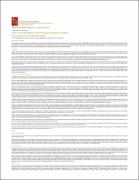| dc.contributor.author | Tren, Richard | |
| dc.contributor.author | Urbach, Jasson | |
| dc.contributor.author | Zambone, Jennifer | |
| dc.contributor.author | Bate, Roger | |
| dc.date.accessioned | 2019-02-15T12:45:34Z | |
| dc.date.available | 2019-02-15T12:45:34Z | |
| dc.date.issued | 2004-08 | |
| dc.identifier.issn | 2073-0683 | |
| dc.identifier.uri | http://hdl.handle.net/20.500.12280/1417 | |
| dc.description.abstract | The insecticide DDT has been very successfully used for many years in malaria control programmes around the world. We assess the validity of the allegations that DDT is harmful to human health and the environment and find that they lack credibility. This is particularly true when one considers the way in which DDT is used in malaria control and the risks that people face from malaria. Indoor Residual Spraying programmes can be sustained for many decades and have been shown to have a considerable impact on malaria morbidity and mortality. However any country considering using DDT or any other insecticide in an Indoor Residual Spraying programme to control malaria should ensure that the right regulatory mechanisms are in place and that the programme is well controlled with scientific and medical oversight. | en_US |
| dc.language.iso | en | en_US |
| dc.publisher | Uganda Martyrs University, Department of Health Sciences | en_US |
| dc.rights | Attribution-NonCommercial-NoDerivs 3.0 United States | * |
| dc.rights.uri | http://creativecommons.org/licenses/by-nc-nd/3.0/us/ | * |
| dc.subject | DDT | en_US |
| dc.subject | Malaria Control Programmes | en_US |
| dc.subject | Malaria | en_US |
| dc.title | Is DDT Safe? Considering Its Use For Malaria Control in Uganda | en_US |
| dc.type | Article | en_US |



